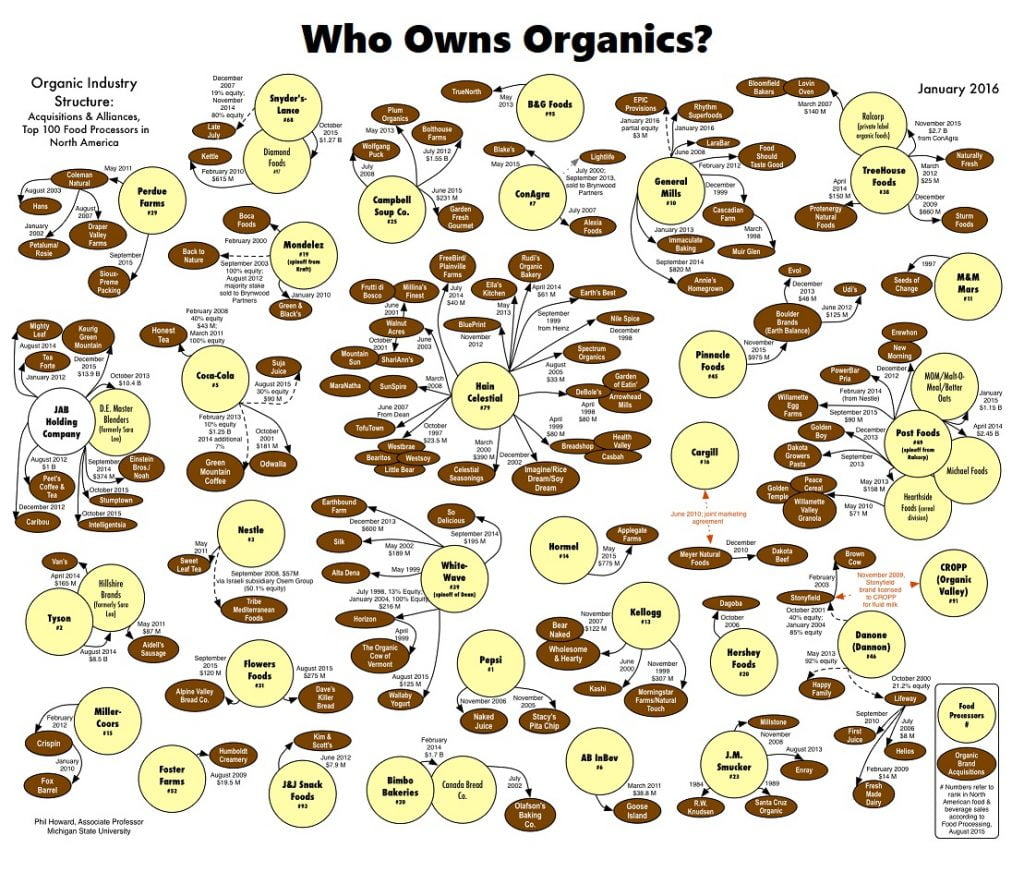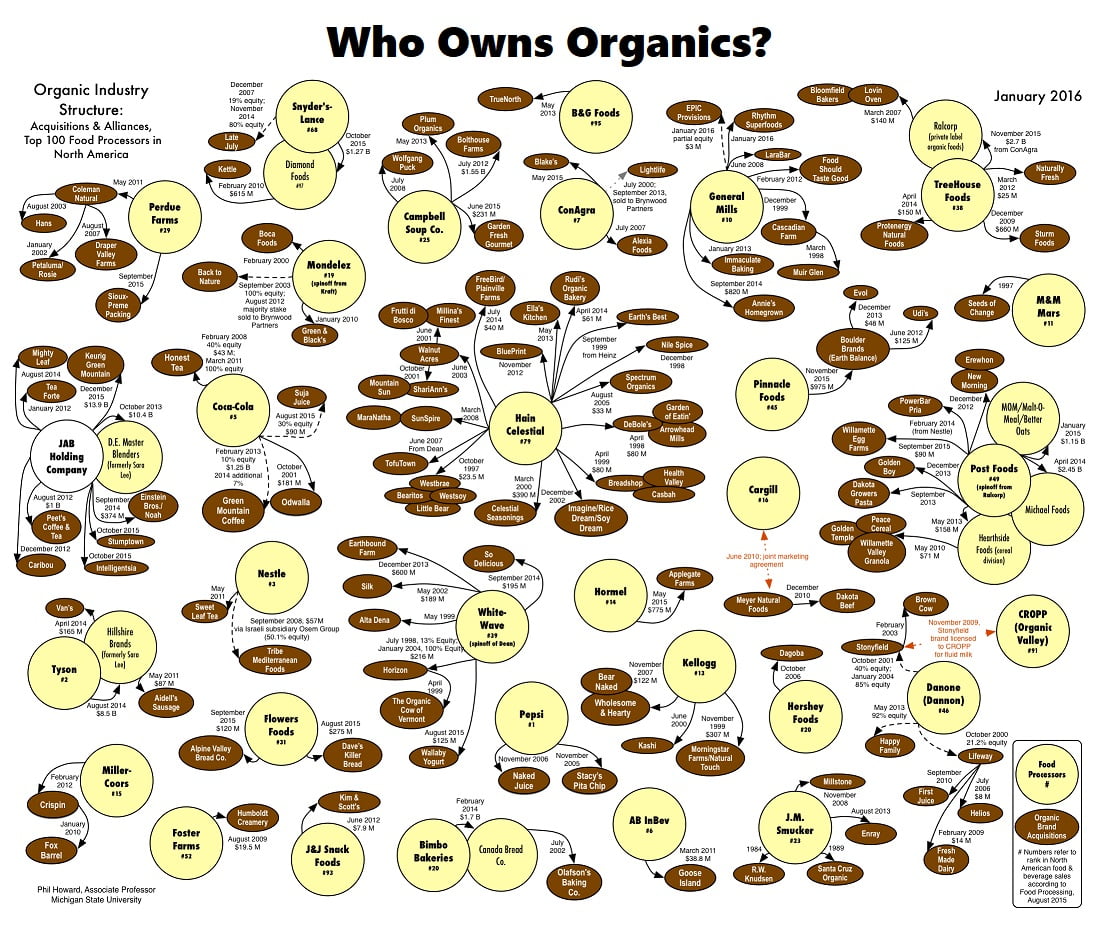
By Alliance for Natural Health,
We thought the problem was limited to fraudulent overseas suppliers; but fake organics are also grown in the US, and the USDA is clueless. Action Alert!
A Missouri farmer has been charged with ripping off food companies and consumers by falsely marketing more than $140 million worth of corn, soybeans, and wheat as organic.
Observers have called the scale of this fraud “jaw dropping” and likely the largest case of its kind involving US farmers.
The level of deception in the organic industry has reached epidemic proportions: a USDA study found that 40% of all organic food sold in the US tested positive for prohibited pesticides.
This is an outrage, but the USDA shows no signs of deviating from business as usual.
The long-running scheme started as far back as 2004, when the Missouri man, Randy Constant, allegedly recruited three Nebraska farmers to supply him with crops. The Nebraska farmers turned a blind eye to Constant’s false marketing because of the premium prices their crops were fetching. The Nebraska farmers pleaded guilty last October.
This episode highlights what we’ve been saying for months now: the USDA, who is responsible for ensuring the integrity of the organic label, is absolutely inept.
First, we had fake organics flooding in from overseas. We were told the problem was with foreign certifiers and that more oversight over the supply chain would reduce the fraud.
But now it appears the problem is much deeper, and the USDA simply lacks the will to enforce the law. How else could such large-scale fraud occur on American soil over the course of a decade?
In fact, it wasn’t even the USDA that discovered the fraud; it was reportedly detected by a buyer after the grain he bought tested positive for GMOs.
We don’t know precisely where the oversight process broke down. The USDA does not perform inspections of organic producers; that is supposed to be taken care of by USDA-accredited, third-party organic certifiers.
Farmers submit an organic system plan to a certifier, describing the methods used on the farm to produce organic crops. Certifiers review the plan and, if approved, are supposed to perform annual inspections which may include residue testing to ensure organic crops have not come into contact with prohibited substances.
Judging from the fraud coming from overseas from certifiers like ETKO, it seems likely that these third-party organic certifiers are also in on the fraud.
What does the USDA’s organic seal mean anymore if the game can be rigged so easily? How many more farmers or businesses are similarly capitalizing on the premium for organic crops without adhering to organic standards? Does the USDA even care?
Take action below and tell the USDA to take steps to address organic fraud.
Action Alert! Write to the USDA and Congress, telling them that the level of organic fraud going on is an outrage, and major steps must be taken to address it. Please send your message immediately.
Read the full article at Alliance for Natural Health.
The Healthy Traditions Glyphosate-tested Program. Foods with this logo have been tested for the presence of glyphosate.
Who Owns Organics infographic from The Cornucopia Institute.
The first wave of acquisitions of organic processors was concentrated between December, 1997 and October, 2002. This period coincides with the initial release of the draft USDA organic standards and its full implementation in October, 2002. A second wave of acquisitions in the organic sector has been occurring since 2012. Surprisingly few major corporate agribusinesses note ownership ties on their acquisitions’ product labels.
Dr. Phil Howard, an Associate Professor in the Department of Community Sustainability at Michigan State and author of the infographic above, has identified some significant updates to his Who Owns Organic Chart, including:
- December 2018: Nestle-Osem divested Tribe (sold to Lakeview Farms)
- November 2018: Kraft Heinz acquired Primal Kitchen for $200M
- September 2018: Kraft Heinz acquired Ethical Bean Coffee
- June 2018: Tyson acquired Tecumseh Poultry/Smart Chicken; ConAgra acquired Pinnacle Foods (Earth Balance/Udi’s/Evol) for $10.9B
- May 2018: Pepsi acquired Bare Foods
- February 2018: Danone’s venture division invested in Harmless Harvest coconut water; Nestlé acquired majority stake in Terrafertil/Nature’s Heart
- December 2017: Campbell Soup Co. acquired Snyder’s-Lance for $4.87B
- November 2017: Unilever acquired Tazo Tea (from Starbucks) for $384M; Nestlé acquired Chameleon Cold-Brew
- September 2017: Nestlé acquired Sweet Earth and a 68% stake in Blue Bottle Coffee; B&G acquired Back to Nature (from Brynwood Partners and Mondelēz) for $162.5M; Unilever acquired Pukka Herbs
- July 2017: Lactalis announced it would acquire Stonyfield from Danone for $875 M; Campbell Soup Co. acquired Pacific Foods for $700 M; AB InBev acquired Hiball
- June 2017: Dean Foods acquired Uncle Matt’s Organic
- Dean Foods acquired minority stake in Good Karma
- April 2017: Unilever acquired Sir Kensington’s
- February 2017: Maple Leaf Foods (#43) acquired Lightlife Foods from Brynwood Partners
- December 2016: B&G Foods (#95) acquired Victoria Fine Foods
- November 2016: Pilgrim’s Pride (#18, but 76% owned by #4 JBS) acquired The GNP Company (Just BARE chicken) for $350 M; Dean Foods and Organic Valley form a 50/50 joint venture; Pepsi acquired KeVita; Dr. Pepper Snapple Group acquired Bai for $1.7 B
- July 2016: Danone announced it would acquire WhiteWave for $12.5 B. Deal completed with the condition that Stonyfield be sold in April 2017
- June 2016: Coca-Cola acquired minority stake in Aloe Gloe; Kellogg acquired Pure Organic
- May 2016: Hormel acquired Justin’s (nut butters) for $286 M
- March 2016: Pulmuone acquired Vitasoy/Nasoya for $50 M
- General Mills investments via its “301 Inc.” venture capital arm include the following: $1.25 M in Tio Gazpacho in March 2016, $2.1 M in Good Culture in March 2016 (+$3 M in September 2016), $18M in Kite Hill in May 2016, additional $6 M in Rhythm Superfoods in January 2017, $6.5 M in Farmhouse Culture in March 2017, and $3 M in Purely Elizabeth in April 2017
Disclaimer: We at Prepare for Change (PFC) bring you information that is not offered by the mainstream news, and therefore may seem controversial. The opinions, views, statements, and/or information we present are not necessarily promoted, endorsed, espoused, or agreed to by Prepare for Change, its leadership Council, members, those who work with PFC, or those who read its content. However, they are hopefully provocative. Please use discernment! Use logical thinking, your own intuition and your own connection with Source, Spirit and Natural Laws to help you determine what is true and what is not. By sharing information and seeding dialogue, it is our goal to raise consciousness and awareness of higher truths to free us from enslavement of the matrix in this material realm.
 EN
EN FR
FR



























If you’ve noticed, that whole list is processed foods. Buy whole foods, know your farmer, shop at food cooperatives.
If you’ve noticed, that whole list is processed foods. Know your farmers, buy whole foods, shop at food cooperatives.
No surprise here?. We seem to have the greediest country in the world, amoung other things !
Those filthy rats!!!
The only ONE thing in this govt that I thought was real and that’s fake too! It’s ALL fake!!
25 years buying organic – geez I bet that thousands of extra money!
Shame on them!